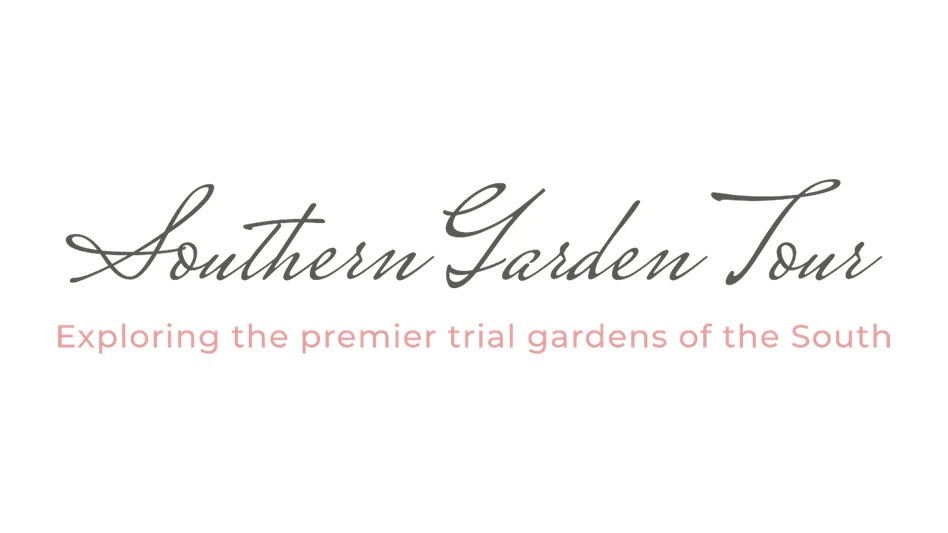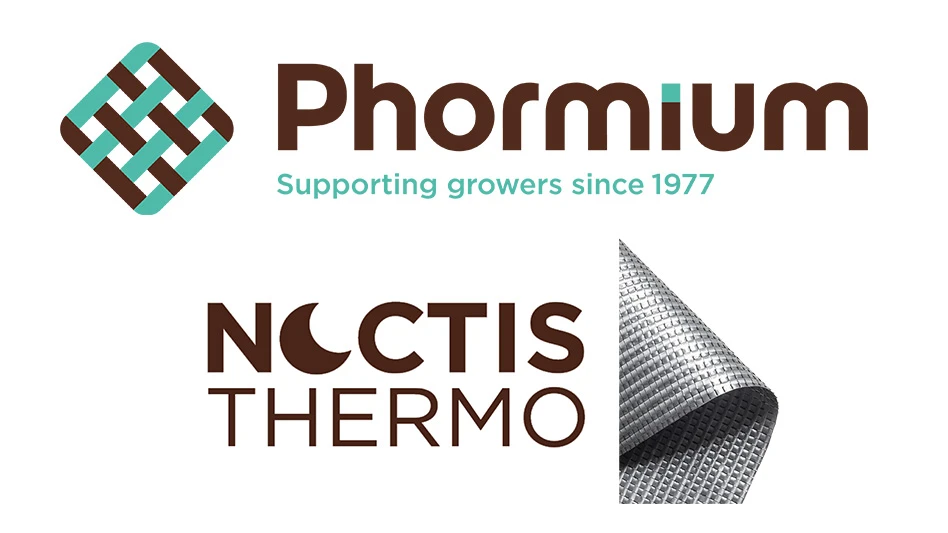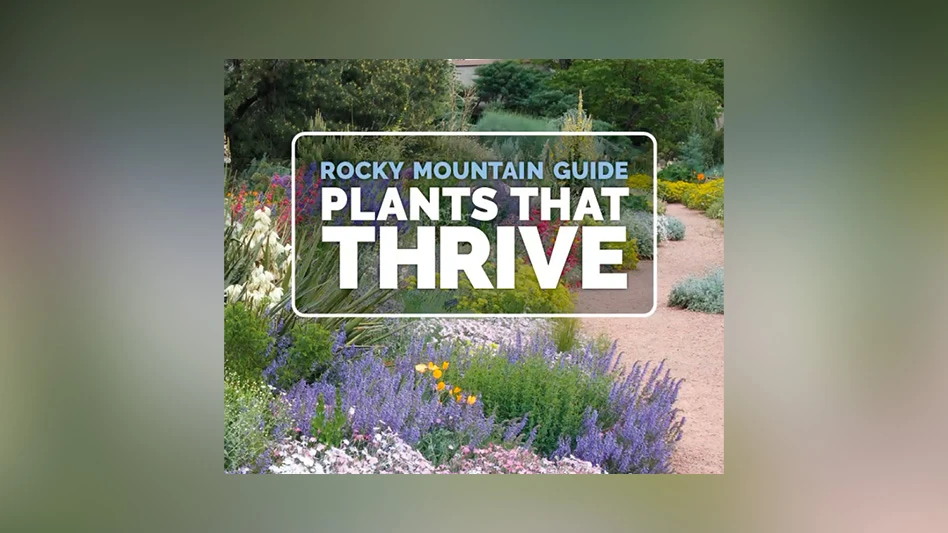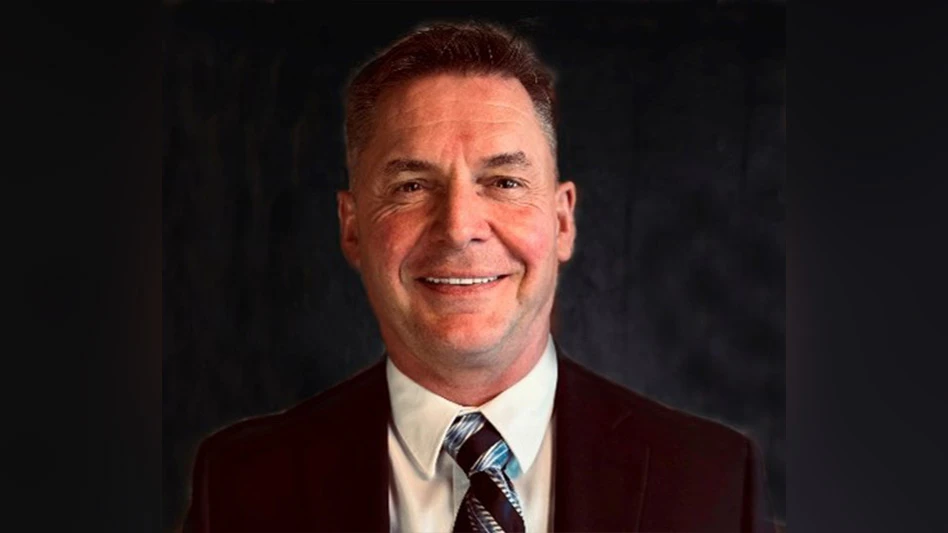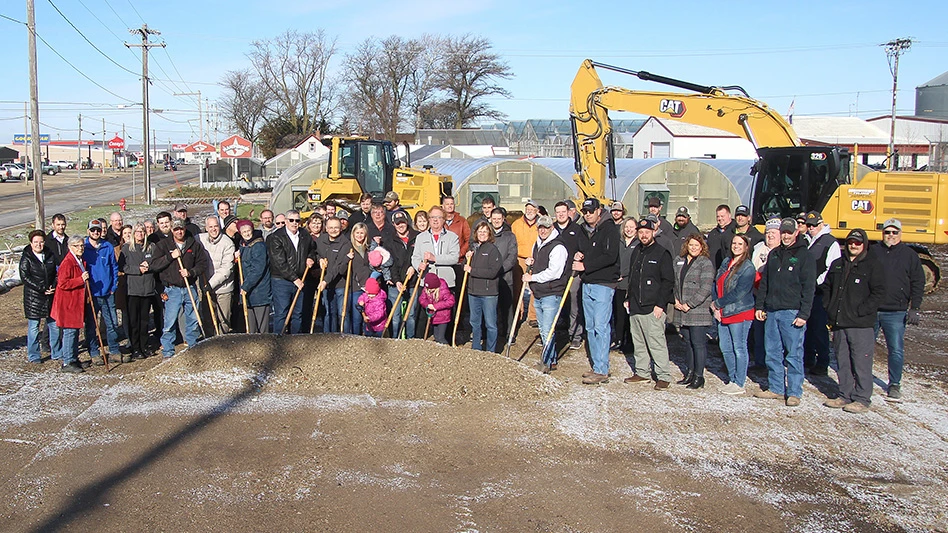Interviews by Cassie Neiden

Never go to bed angry. Always listen to the other person. Give reminders often about why you value each other. Be honest with one another.
These are good virtues for all marriages, but throw a greenhouse business into the mix, and you’ve got a whole separate list of lessons to learn: How do you separate work and home life? What’s the best way to interact in front of your employees? How do you make important business decisions? The list goes on.
These couples have learned how to do it right, though their victories have not come without trials and tribulations. See how these partners in both life and business have come out on top.
Editor's note: Interviews were edited for length and clarity.
Trial and error
Location: Rougemont, N.C. Years married: 31
John and Jill Hoffman met 32 years ago in Raleigh, N.C. John owned a landscaping company, and Jill was completing her Ph.D. in toxicology at North Carolina State University. Although John’s landscaping business was doing well, he felt drawn toward the nursery side of the industry. They married in 1985, purchased an old tobacco farm in 1986, and started an ornamental and native grass nursery from the ground up, learning the ropes along the way. Here is a piece of their story.

Greenhouse Management: What were some of your biggest challenges starting out?
John: When we started, we were focused on growing. My landscaping experience hadn’t included propagation or container production. We had to figure out the best way to make divisions and stick them. And the weather was a challenge. We had above-ground irrigation, and that first winter really opened our eyes. We had to learn how to irrigate the right way and protect the plants from freezing.
On top of all the growing challenges, we were trying to learn about business in general. Neither of us knew much about business or accounting.
Jill: Our other challenge was finding the market. When we started 30 years ago, there weren’t a whole lot of grasses around. People kind of looked at you funny when you said you grew grasses. They thought, “Oh, yeah, I mow every Saturday.” They just didn’t quite get what we were doing.
The whole time we’ve been in business, educating people about ornamental grasses and how to use them has been part of the deal.
John: What really helped us early on was working with the great plantsman, J.C. Raulston. He had a lot of influence on our industry, and although he died in ’96, his legacy has continued. Back in the ’80s and early ’90s, he was saying grasses were the next big thing. He taught his students at North Carolina State University about ornamental grasses, and he helped spread the word about what we were doing. Having his approval meant a tremendous amount to us.
GM: How did you eventually learn the business?
Jill: Starting out, we learned every bit on the fly. Then we realized there were people around us who knew a lot. So we started asking advice.
After about 15 years, we formed an advisory board for the company. We worked with people who really knew the business and knew finance. They became our sounding board and helped us make informed decisions. We still do a few things on the fly, but we’re still learning and always will be.

GM: What’s it like working together as husband and wife?
Jill: I spend a lot more time in the office than John does. He’s often outside, walking the nursery and looking at the operation. We’re building a greenhouse right now, and he’s out dealing with the contractors and the scheduling. We share an office, which I thought was important from the beginning. We see each other every day, and that’s good. We have a sense of what’s going on and can fill in for each other when one of us isn’t available.
John: It’s worked well because we complement each other. I like getting out and enjoy working with customers. Jill’s more behind the scenes. Dividing the work lets us play to our strengths.

GM: What are some of the biggest challenges working together?
John: One of the problems, of course, is that we take work home with us. It’s hard to get away from a business when you’re both in it. We won’t spend all night on business, but if something needs our attention, we can discuss it at home, too.
Jill: But it is hard to turn it off after you leave.
John: Sure. We moved to the property in ’86 when we opened the nursery. At the time, we figured we’d move to a much larger house off site in a couple of years. Well, we moved, but 15 years later. It wasn’t two years later.
That was eye opening. The nursery can be all-consuming and take everything from your last breath to all your money. But we’ve come a long way over the years. With the help of our team, we’ve built something rather nice.
Jill: The biggest thing is that it doesn’t get any easier. You think that after 10 years you’ve learned something. You think after 20 years you’ve learned something. You think after 30 years you’ve figured it out. No, you haven’t.
Something new always comes up, whether it’s a new regulation or a new plant to figure out. Like this last recession. It was tough. No one had been through that before, and we had to figure out how to survive and have our team do well.
GM: Speaking of the recession, what did you learn from that experience?
Jill: We learned we had been pretty conservative in how we grew our business. But that became a big plus. That’s led us to be even more conservative. We’re growing more quickly now, but we’re a lot more thoughtful about how we grow. We have worked to make sure we’re prepared if another recession comes along. The procedures, protocols and plans will be in place. And that will help us handle it a lot better than we did before. I think we did okay, but we can always do better.

GM: What about the next generation of greenhouse power couples? Do you have any advice for them?
John: Experience in economics and finance would have helped us. I would like to have known what to look at in the numbers world and understand it better. Of course, now we look at [consumer] trends and economic indexes, but it’s taken time to get there.
Jill: It’s also taken time to develop our marketing, which is critical nowadays. We’re just now really getting into the marketing and setting up a long-term strategy. I’d suggest getting started on a plan as early as you can.
John: Couples can look at each other’s strengths and weaknesses and divvy up the jobs. Decide who does what best and accept that you can’t do everything. It can be hard, but you just get on with it. You each do your job and trust the other.
Jill: It’s funny. When we started this thing, we had no clue. We had no clue that we’d need more than a couple of people working here.
John: Well, if you expect to keep growing, there’s no way two people can handle what we’re doing here. Our biggest job turned out to be building a team. They’re the ones who’ve made things happen for us.
Human capital
Location: Mayflower, Ark. Years married: 18
Andrea and Richard Cleaver met when they were 14 years old, married at 21, and purchased half of Culberson Greenhouses in Mayflower, Ark. at 34. In the meantime, they’ve taken some major risks together, like leaving a big-box garden center to work for an independent garden center, and purchasing a greenhouse immediately following the latest recession. Now, at 39, they have 18 years of marriage under their belts, gained valuable experience over the past five years owning a company, and have found success. The trick, they say, is to treat the people around you right — from your customers, to your employees, to your spouse — and the rest will fall into place.

Greenhouse Management: What is like working together?
Andrea Cleaver: From my side of it, I would say it’s 99-percent awesome. It’s fun because we both have an extreme passion for what we do. At the same time, because we’re so passionate, that passion leads down different directions and we have different opinions. That’s where 1 percent comes in. You have to work out something with someone, then have to go home with them at night and sleep in the same bed with them, so that is the tricky part. It is a challenge some days, but most days it’s great because Richard and I have a really close relationship.
Richard Cleaver: There’s no shortage of time spent together. We never run out of things to talk about at dinner. Because we spend so much time running the business together, there’s more to say than we want to say. For some couples, that could drive you apart because of the stress, but we lean on each other and depend on each other.
GM: What have been some of the biggest lessons you’ve learned over the years?
Richard: You can’t underestimate the importance of organization and planning. We value long-term planning and being organized. Our staff appreciates us being organized. If things are chaotic, then it’s chaotic for us and chaotic for the staff. But if we have a clear plan, then they can see that plan and they know where they fall in line with that plan.
Andrea: For us, a quality, loyal, reliable employee who cares about your business as much as we do — that’s our most valuable asset in this business. Sometimes there’s no amount of money that someone could give me to have one of my employees. I just wouldn’t give them up for anything.
They take pride in our business and they’re the reason we are as successful as we are. We just got through giving out some Christmas bonuses to our employees, and we always try to write them a hand-written letter, [saying] “We’re so blessed to have you on our team. We couldn’t do it without you.” I never say, “I’m so glad you work for me.” I always try to say, “You work with us.” Because we’re out there with them every day from the time they get there until after they leave. We’re not just sitting inside letting somebody else make us money.
And because of that, we have employees who care. So a lesson I’ve learned is you’ve got to treat your people good, and they’ll treat you good back. They’ll take care of you if you take care of them.
GM: What was one of your biggest challenges coming into the business? And how did you overcome it?
Richard: When we first started, our business owners had been doing this for so many years that they knew the suppliers, they knew who to get the best begonia from, who to get the best vinca from, and they knew the suppliers in and out, they knew the sales reps.
When it came time for us to take over the ordering, we struggled at first. We had to sit down and list out all of the vendors, and find out who our reps were. Andrea made the decision to consolidate all of our brokers. Where we might have had 10 or 12 brokers, she and I figured out that if we just used one broker for everything, then we only had one person to call if we had a problem. We didn’t have to figure out, “OK, who did we get clematis from?”
What we had to do is take all of the orders and put them in spreadsheets so that we could track year-to-year who we were getting product from and when we were projected to plant certain plants. It was tough that first year; there were a lot of tears.

GM: How do you separate work life from home life?
Richard: When you live on site and your customers know that, they think you’re on call 24/7. And sometimes it’s difficult whenever a customer shows up at the front door after dark, and they just need something real quick, but you’ve already flipped the switch and you’ve turned work off for the day and now it’s family time. You want to be respectful of that customer and you want to be nice, and somehow you’ve got to find a way to work into a conversation with them, “Yeah, we’re closed right now. We don’t normally do this, but I’ll help you this time.”
What helps us to separate work from home the most is a bottle of wine at the end of the day. We do Blue Apron meals, which are home-delivered meals that we prepare together, and we talk about something other than work when we’re preparing them. We have two Jack Russell dogs. And at the end of the day, you look forward to going and playing fetch with the dogs and it’s real easy to forget all about your worries at work when you have two dogs licking you in the face.

GM: How do you two work together with your customers?
Andrea: Richard is a people person. I am not much of a socializer. I’m more of an introvert, where I feel like he’s more of an extrovert. He loves to talk to people on the phone. He could just sit — and he does — take calls all day long and sell, sell, sell.
We always kind of make fun of Richard, how he’s just always on the phone talking to somebody or somebody pulls up, and he’s talking to them for a really long time. We’ll say, “Gosh, he never shuts up.” But at the same time, he gets sales. He gets people to fall in love with him — people love Richard, he’s such a nice guy. I really think they love the fact that it’s just a young couple running a business.
We care about people and we want our customers to be successful. It’s not just, “Here are your plants. Where’s my check? OK, see you next year.” We really try to bend over backwards.
GM: Anything else?
Andrea: I’ll just say it’s pretty nice being able to get up and go to work with him every morning. We’ve got the same schedule, same days off — and some people don’t like that.
He could be three greenhouses over and couldn’t hear me if I was talking to him. But I can see him and I can look up and smile and be happy. And after 18 years of marriage, we still haven’t gotten tired of being around each other.
Niche network
Location: Kintnersville, Penn. Years married: 38
In the greenhouse industry, Lloyd and Candy Traven are household names. Known for becoming one of the first predominantly herb growers in the ’80s, they’ve shown that business can prosper when you find a gap in the market, and create a demand for it. As of late, their biological techniques and diverse organic edible offering is gaining the attention of ivy-league graduates, as well as Iron Chefs. Here, they share with us how they got to where they are today.

Greenhouse Management: Let’s start by learning how you two met and how the business started.
Lloyd: I met Candy purely by chance at another girl’s house. Within 5 minutes of meeting her, I knew that, “I’m marrying this girl.” It was over and done, slam-dunk. And she was less convinced than I was.
Candy: I actually stood him up on our first date. I guess if you really want somebody, just play a little hard to get [laughs].
Our first day of business was May 1 [1983], and we had an empty greenhouse. Nice timing. Literally, there was nothing in the greenhouse on May 1. They had been closed since Christmas, the other company.
So here we are. There’s one hose in a 10,000-square-foot greenhouse and there’s no potting bench, no product —
Candy: There was a bale of peat moss, and I just sat down and cried because [I thought], “Oh my gosh, what have we done?”
Lloyd: We had 10,000 mums coming because people had said we were set up for 10,000 mums outdoors. Well, they had 2,000 [drip tubes] set up. We are filling pots as fast as we can. We start laying it out, and it’s like, “We need 8,000 more drip tubes here.” So I am literally building the irrigation system around the plants.
It was awful, it was horrible. We were kids, we were very young.
Candy: We were in our 20s.
Lloyd: But we had really good contacts.
Candy: We already had connections from living in the area. Lloyd had worked at another greenhouse. I worked for Hidden Garden. So we knew who was selling what and who was growing what.
We figured out who we wanted to sell to first before we determined our products. What did they need?
Lloyd: And how do we convince them to buy from us?
Candy: And then another part of our concept was growing 4 ½- inch pots, instead of growing big things.
Lloyd: Candy had said the first year we were here, “We have to grow herbs.”
Candy: He thought I was crazy.
Lloyd: I said, “You are out of your mind. Who the hell is going to buy herbs? Basil? What?” We are now producing hundreds of hundreds of thousands of herbs.
Candy: Because nobody else was doing herbs. And there was no demand.
Lloyd: We literally created that market 33 years ago and we have been doing it ever since.

GM: Lloyd, what’s the best part about working with Candy? And Candy, what’s the best part about working with Lloyd?
Lloyd: That is a great question. I use this in my speeches all the time: I realize that I could not do this, I never would have been successful if she hadn’t been there. And I talk about her as my muse, my inspiration for this, that you can’t run a beauty-based business on data analysis. There’s that creativity, that sense of wonder and joy that a technician just doesn’t normally have. I don’t have that. I know beauty when I see it, [but] that’s a different kind of thing. But for me to put together a combination that just sings to people…I could duplicate it but I could never make it myself. That takes a very, very special skill.
The other part of it is to be with somebody all the time who cares so much about what she does and how other people are treated. It’s a great life lesson to have somebody who doesn’t just talk about it but does it.
The third thing is that I’ve never met anybody who works harder. Never in my life have I met anybody like this.
Candy: Lloyd is the advocate for the small grower, and Lloyd has always been that. I love the fact that he’s kind of always been a rebel. We never fit the mold. It’s just being outside the box, but really able to clearly communicate or think a thing through. Because a lot of times I think I have trouble with words. I’m visual, I’m hands-on. I often feel like I can communicate with him without words and then he can communicate what I’m trying to get across.
GM: What advice would you give to another young couple who owns a greenhouse?
Candy: Don’t take it too serious. You could really eat yourself up.
Lloyd: And it’s not life. Life is your family, and your health, and your mental interests, and your physical interests, and music, and things like that. This is what provides the means to do it. And the other part — which is a totally different — is also at the same time, an incredible passion. And if you don’t feel that passion, you will never communicate that to your employees or your customers. And they will vote with their pocketbook, or walking out the door. And if you don’t feel that, because it demands that kind of commitment and passion, you need to find something else to do. You’ll always work for somebody else. You just won’t make it.
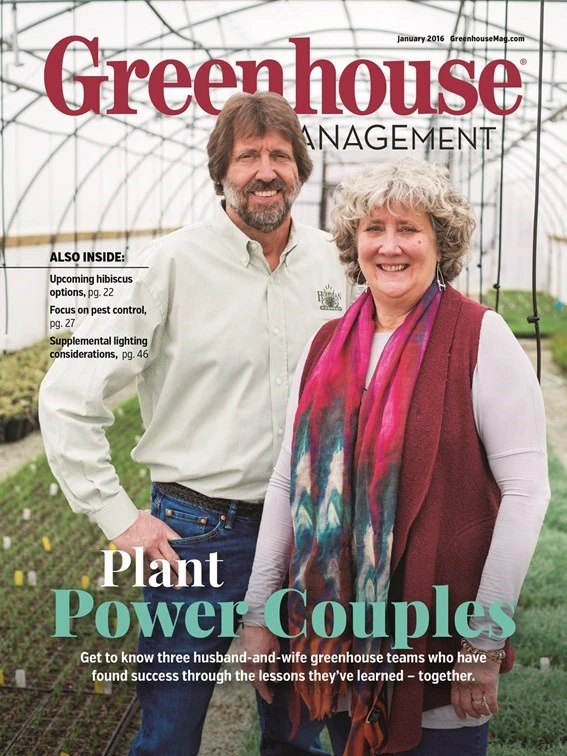
Explore the January 2016 Issue
Check out more from this issue and find your next story to read.
Latest from Greenhouse Management
- This month's Greenhouse Management magazine is about native plants and sustainability
- The HC Companies, Classic Home & Garden merge as Growscape
- Terra Nova releases new echinacea variety, 'Fringe Festival'
- Eason Horticultural Resources will now officially be known as EHR
- BioWorks receives EPA approval for new biological insecticide for thrips, aphids, whiteflies
- ScottsMiracle-Gro transfers cannabis subsidiary to focus on core lawn and garden business
- Should we start calling natives 'eco-beneficial plants'?
- Ellen Mackenbach-Lakeman appointed new CEO of Dümmen Orange

